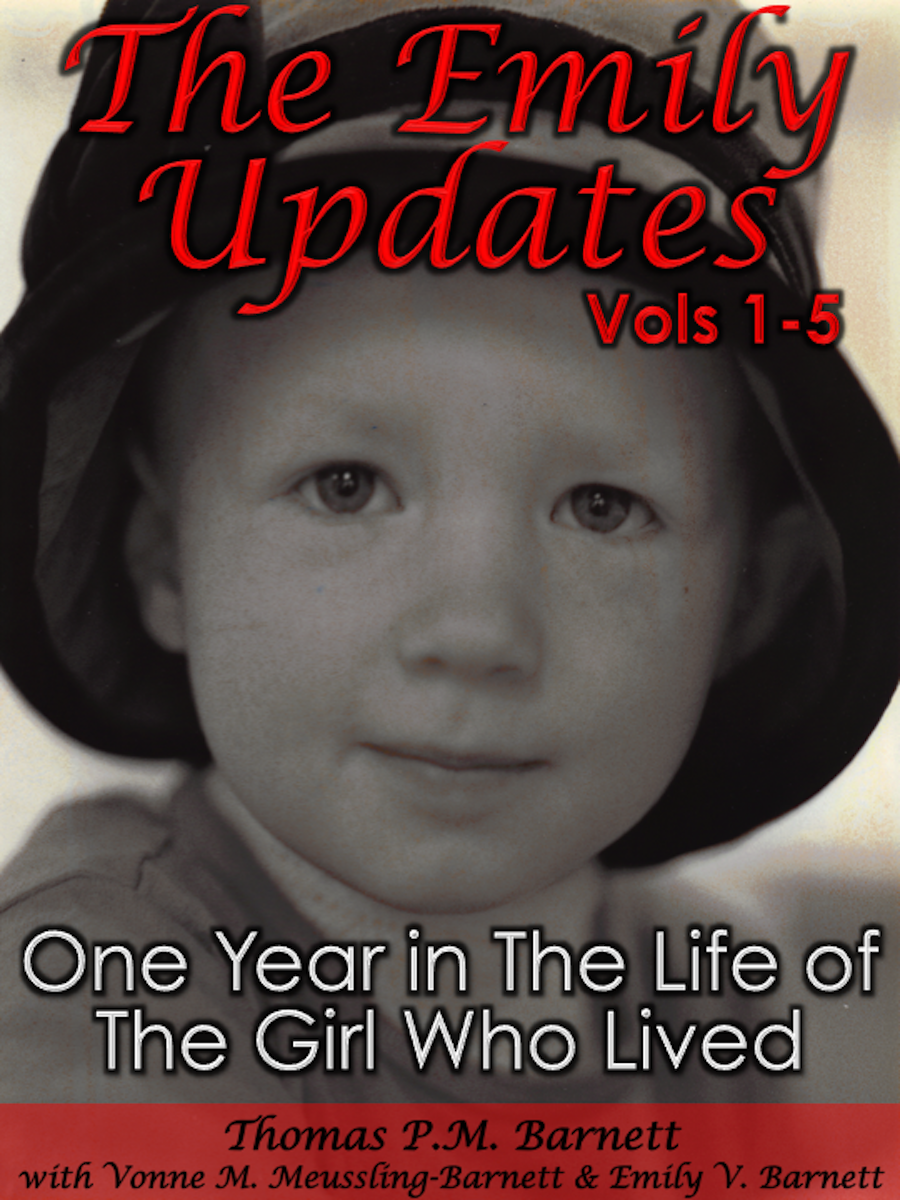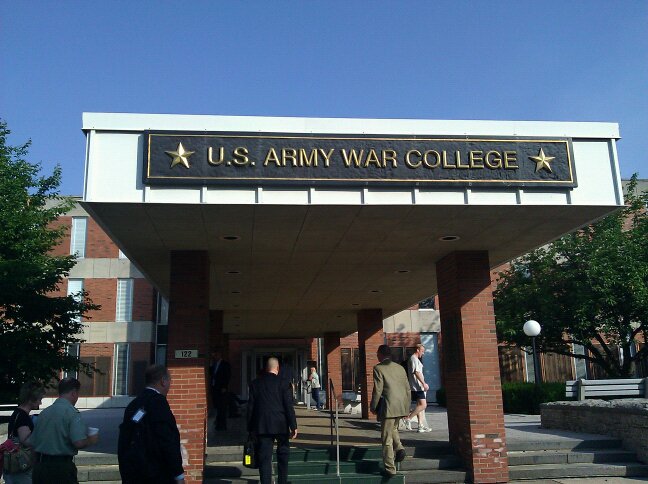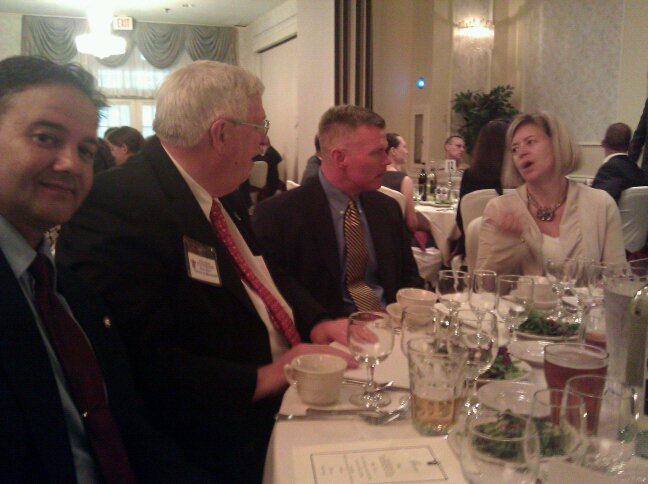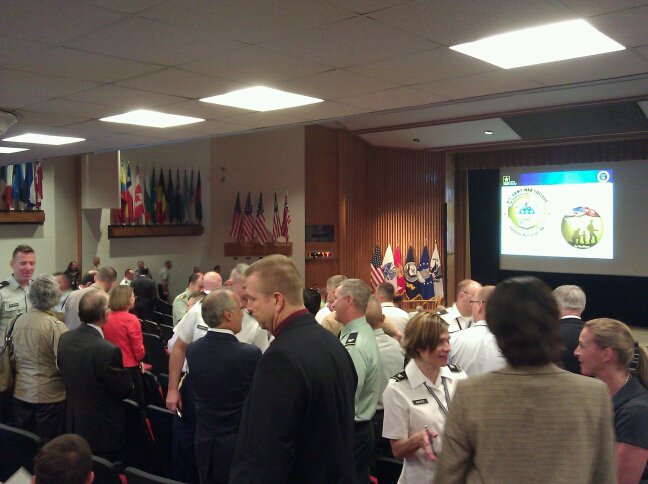Wednesday, August 10th, 2011
Thanks to courtesy copy sent by Tom, I just began reading this:

Many people, including myself, have had the experience of a loved one suffering with cancer or battled cancer themselves. Cancer is an onerous, arduous disease, but having your child be diagnosed with cancer must be another whole level of terrifying.
Will have a review and something extra soon.
Posted in authors, barnett, book, Character, reading | Comments Off on New Book: The Emily Updates
Saturday, June 25th, 2011
From Thomas P.M. Barnett and Wikistrat:
Grand Strategic Competition Update (Week 2)
…As head judge, I assign points to teams based on their activity throughout the week. In this second week, each team generated those two trajectories to the tune of about 10,000 words each, or close to 300,000 words across all the teams. Naturally, a ton of interesting nuggets emerged, so here’s my hit list of provocative ideas.
1) US turns back toward Western Hemisphere as part of reduced global footprint, need to deal with drug/crime nexus, and desire to balance growing Chinese influence across region (BRAZIL1/Institute of World Politics 2)
Every new US president hits the ground running with the promise to pay more attention to the Western Hemisphere – and then promptly forgets the entire idea. So far, Barack Obama has held to form, and yet the dynamics cited here make for a compelling argument. A US that pulls back from the world and gets it own house in order must certainly look southward for some of its solutions – particularly on the disastrous drug war. Brazil, as the IWP2 team points out, is the key dynamo of the region, so either the US recognizes that and accommodates Brazil’s ambitions, or it may find itself the odd man out throughout South America…
Time’s Battleland: Future grand strategists: Russia will someday be forced to outsource its security
Hailing again from Wikistrat‘s International Grand Strategy Competition (30 teams of grad students/interns from elite universities and think tanks around the world), where I serve as head judge (and I get paid), I wanted to share the decidedly provocative vision of Russia’s long-term future security paradigm as crafted by the New York University team (find their national trajectory here). A certain segment of the US national security establishment got all jacked by Russia’s short war with tiny Georgia in August 2008, seeing in that raw display of power a “resurging” military superpower. NYU begs to differ…
Shades of Chet Richards and Steven Pressfield.
Posted in barnett, DIME, strategist, strategy, Wikistrat | Comments Off on Barnett on Wikistrat’s Grand Strategy Competition and…well…Grand Strategy
Sunday, June 12th, 2011

As noted previously, I was fortunate to attend the National Security Seminar at the the US Army War College this year and wanted to relay my impressions while they were still fresh.
First, in terms of reception and cordiality, I have rarely experienced such an extensive and personal outreach as was demonstrated by the War College staff, faculty, administration and students. Every new member had a “sponsor” – a student, usually a colonel or Navy captain, who acted as a liason and personal guide from the time their plane touched down until the moment they returned to the airport. My sponsor, the former commander of the Wolfhounds, Colonel Richard “Flip” Wilson, whom I consider a friend, really extended himself on my behalf, making me feel welcome and a full member of Seminar Group 20. Most of the students have multiple tours of duty in Iraq and Afghanistan under their belt and many can report the same for the first Gulf War, Panama, Bosnia or Kosovo.
The War College, the Commandant and the Seminar Group all hosted receptions and dinners designed to get students and civilian new members to mix and further discuss issues raised in the seminar sessions or lectures. At these events I had the opportunity to meet and talk to the leadership of the Army War College including the Commandant Major General Gregg Martin, the Deputy Commandant for International Affairs, Ambassador Carol Van Voorst, the Executive Director of the Army Heritage Foundation, Mike Perry, the Director of SSI, Dr. Douglas Lovelace, the Chief of Staff and numerous faculty and seminar members. The New Members such as myself were exceedingly well fed at these events as I suspect the Army was attempting to prove that it really does march on it’s stomach.


The serious business of the National Security Seminar was divided into two segments, the talks given by distinguished speakers to the entire class of 2011 and the New Members and the Seminar Group sessions of approximately twenty students, New Members, academics and foreign visitors. We received a brief on the war in Afghanistan from the ISAF Chief of Staff, who was standing in last minute for General Petraeus who was called to meet with senior adminstration officials; and a very interesting concluding talk by Foreign Affairs Editor Gideon Rose, author of How Wars End, which covered issues of strategy, grand strategy and the disconnect with policy.

The National Security Seminar is run strictly on a non-attribution basis, in order to encourage candor and frank exchange of views, which handicaps my ability to discuss specifics here. I can say that my views on Pakistan ( which I compared to “North Vietnam” ) riled more than a few people – Pakistan is the only country in the world given 2 exchange student slots at the Army War College at the request of the most senior leadership of the US Army – and several students and faculty members took the time, outside of seminar sessions, to make certain I heard countervailing POV regarding Pakistan’s value as an ally. Other topics included, but were not limited to:
Defense budget cuts and force structure
Narco-cartels in Mexico: Insurgency or No?
Civil-Military Relations
Repeal of DADT
AfPak War
al Qaida and GWOT/US Strategy
COIN
Critical thinking and Leadership
Logistics
Libya and NATO
AWC Strategy Curriculum/Program
What the US public expects from their military
China as a peer competitor
Effects of ten years of war on officer corps/military
Illegal combatants and international law
PTSD
Battle of Gettysburg and Grand Strategy
Cyberwar
Differences in Armed Services strategy, command climate, discipline, leadership
The Arab Spring
US Global leadership and Economics
Interagency Operational jointness
Most of the discussion took place in the seminar groups, with Q&A periods in the mass sessions with featured speakers. I came away deeply impressed with the seriousness and insights as practitioners that AWC students brought to the table. The AWC strategic studies program seeks to broaden students who are assumed to arrive with tactical expertise and prepare them for higher command that carries operational, strategic and even policy responsibilities (at least in terms of interpreting and executing within policy guidelines). Many students were articulating ideas associated with Thomas P.M. Barnett, the “mission order” and “commander’s intent” style of leadership or Clausewitzian strategic premises during debates and discussion.
The National Security Seminar Week was for me, an enlightening and exceptionally enjoyable experience, one I would highly recommend to readers who may have such opportunities in future years.
Posted in 19th century, 2011, 20th century, 21st century, 3 gen gangs, 4GW, academia, Afghanistan, Air Force, al qaida, America, army, barnett, Clausewitzian, cognition, COIN, counterinsurgency, Cyberwar, defense, DIME, diplomacy, diplomatic history, education, Epistemology, foreign policy, government, historians, history, ideas, insurgency, intellectuals, intelligence, leadership, metacognition, military, military contractor, military history, military intelligence, military reform, national security, Network-centric Warfare, organizations, security, social science, strategist, strategy, Strategy and War, Tactics, theory, war, warriors | 12 Comments »
Monday, May 9th, 2011
Dr. Barnett is now a blogger for TIME Magazine’s Battleland
Right out of John Boyd’s strategy: disconnect, isolate & disempower your enemy
But Osama, looking far older than his 54 years, had none of that. He was down to just a sad little entourage, and his comms were reduced to thumb drives smuggled in now and then. He is isolated, almost imprisoned, and he looks like a man sapped of all vitality.
…This is right out of American strategist John Boyd’s playbook: you beat your enemy by isolating him, denying him allies, keeping him in the dark and – bit by bit – wearing down his energy: “Interaction permits vitality and growth, while isolation leads to decay and disintegration.”
Read the rest here.
Posted in al qaida, barnett, blogging, blogosphere, john boyd, strategy, Strategy and War, war | 7 Comments »
Wednesday, April 27th, 2011
From Thomas P.M. Barnett…..
International Grand Strategy Competition – Last Week to Sign Up

As Wikistrat International Grand Strategy Competition is getting closer, more analysts representing leading universities and research institutes are coming on board. For all of you who still don’t know what it’s all about – have a look here. The first ever collaborative Grand Strategy Competition will take place online throughout June with select teams competing for the $10,000 prize.
This week is the last opportunity to sign up. The best teams will join an exclusive group of teams representing top institutes such as Georgetown University, CSIS, New York University, Columbia University CSIS, the Institute for World Politics, NATO’s Atlantic Treaty Association and many more…
If you wish to join – Apply now.
I am privy to the list of teams, but not free to blog it. I can say, it’s first tier, with well known acronym institutions involved. If you are a grad student in the IR/Security Studies/mil history fields and you have a few bright amigos, I strongly suggest you give this a shot. At worst, you will learn a few things and have some useful networking opportunities with peers and interested sponsors in dark suits. At best, someone will walk away with $ 10,000 and some throw-down bragging rights.
Posted in barnett, strategist, strategy, Strategy and War, Wikistrat | Comments Off on Speaking of Grand Strategy….







